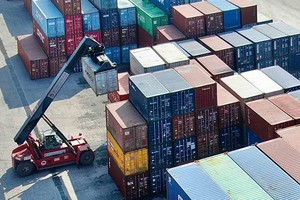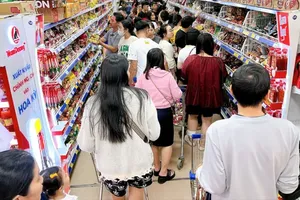US tariffs and their impact on Vietnam
The US has imposed high tariffs on imports from several countries, and Vietnam, with its large trade surplus with the US and a trade deficit with China, faces the possibility of being targeted next. According to Dr. Vo Tri Thanh, Director of the Institute for Brand and Competitive Strategy, if the US extends its tariff policies to Vietnam, it could significantly impact trade balances, exchange rates, supply chains, and foreign direct investment (FDI) inflows.

The US remains Vietnam’s largest export market, accounting for nearly 30 percent of total export revenue in 2024. During Donald Trump's first term, Vietnam, along with several other economies, benefitted significantly from the US-China trade war as many manufacturers moved their operations to Vietnam to bypass US tariffs. This helped Vietnam achieve the third-largest trade surplus with the US, following only China and Mexico.
However, during Trump's second term, Vietnam may no longer enjoy the same benefits. Foreign direct investment (FDI) could slow down in early 2025 as investors wait for more clarity on whether Vietnam will become a target for new tariff policies.
In the past, US tariffs on Vietnamese goods had little impact. But as 2025 approaches, Vietnam's Ministry of Industry and Trade has forecasted two potential scenarios. In the optimistic scenario, the US maintains its current tariff policies on Vietnamese exports, and the ongoing supply chain shifts could continue to attract new investment, boosting exports.
In the second scenario, if the US imposes stricter tariffs, global economic disruptions could follow, and Vietnam’s exports would likely face negative consequences. China, a key US partner, may also struggle, which would place additional pressure on Vietnam’s economy.
Potential trade retaliation and risks
The possibility of retaliatory tariffs among major economies raises additional concerns. According to Mr. Ngo Chung Khanh, Deputy Director General of the Multilateral Trade Policy Department at the Ministry of Industry and Trade, trade conflicts could indirectly affect Vietnamese businesses. If the US imposes higher tariffs on Chinese goods, Chinese manufacturers might attempt to reroute products through Vietnam to evade tariffs. This could lead to increased scrutiny of Vietnamese exports and potential trade defense measures from the US.

In the past, Vietnam has faced punitive tariffs on products like steel and aluminum due to concerns about their origin from China. This remains a risk that needs to be closely monitored and managed. The Ministry of Industry and Trade is currently keeping a close watch to assess the potential impact.
For other markets such as Mexico, Canada, and the EU, however, the effects of the US-China trade conflict have been minimal. Vietnamese exports to these countries continue to follow the commitments outlined in free trade agreements (FTAs), with preferential tariffs still applied as usual. As a result, businesses can continue to export to these markets steadily without being impacted by US tariff policies.
Mr. Ngo Chung Khanh has warned of a real risk that Vietnam must face amid the US-China trade war. When the US imposes high tariffs on goods imported from China, some Chinese companies may seek to bring their products to Vietnam, conduct preliminary assembly or repackaging, and then export them to the US under the label of Vietnamese goods to avoid tariffs. This is a genuine risk that Vietnam needs to closely control to prevent the US from applying trade sanctions, as occurred during the first term of President Donald Trump. At that time, the US imposed tariffs on some Vietnamese exports due to suspicions that they were originating from China.
On the other hand, there is also an opinion that the US-China trade war brings benefits to Vietnam, because when the US raises tariffs on Chinese goods, many buyers may turn to Vietnam for imports, creating opportunities for Vietnamese businesses
"We could benefit from shifting investment flows, expanding supply chains, and increasing exports. However, these benefits will only be sustainable if Vietnam effectively manages investment quality and prevents trade fraud," he said.
Opportunities and strategic responses
In addition to closely monitoring the situation and minimizing negative impacts, Dr. Vo Tri Thanh suggests that Vietnam can leverage the US-China trade conflict to maintain its position as a competitive investment destination. Vietnam must navigate these uncertainties with caution, take proactive measures, and capitalize on new opportunities amid global tensions. The country maintains a strong financial foundation, with public debt under 40 percent of GDP, while its infrastructure continues to improve, and the legal framework is evolving, providing a solid base to withstand external shocks.
Dr. Vo Tri Thanh emphasizes that managing relationships with major partners flexibly and skillfully is crucial. Vietnam holds an advantage in this area as it is a strategic or comprehensive strategic partner with many major powers, boosting its international standing through prudent diplomatic policies. Furthermore, Vietnam needs to continue strengthening diplomacy to diversify its export markets.
Mr. Ngo Chung Khanh emphasizes the importance of market diversification. With nearly 30 percent of Vietnam’s exports going to the US, overreliance on a single market poses risks. Many businesses today are focused on the US market, without fully utilizing the opportunities provided by existing FTAs. Markets like the EU, Canada, and Mexico still have significant untapped potential, yet Vietnam's market share in these regions remains low, making up only a few percent.
Thus, businesses need to proactively leverage the benefits of these FTAs and expand exports to more stable, sustainable markets. In every challenge lies an opportunity. The ongoing trade war serves as a reminder that Vietnam has yet to fully exploit the potential of the FTAs it has signed.
























